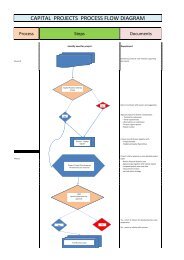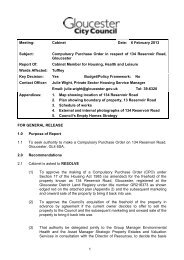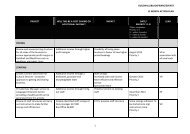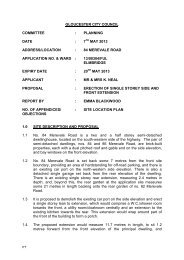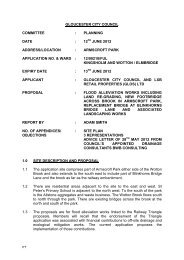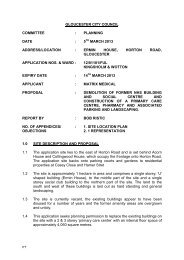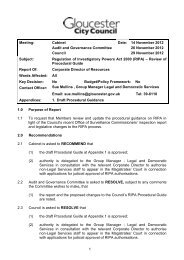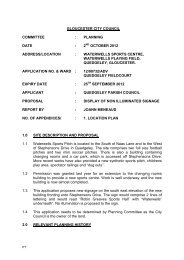Regulation Of Investigatory Powers Act 2000 (RIPA) - Democracy ...
Regulation Of Investigatory Powers Act 2000 (RIPA) - Democracy ...
Regulation Of Investigatory Powers Act 2000 (RIPA) - Democracy ...
You also want an ePaper? Increase the reach of your titles
YUMPU automatically turns print PDFs into web optimized ePapers that Google loves.
2012, which will cover changes in the <strong>RIPA</strong> process due to come into force later thisyear as well as the procedure to be followed.3.5 The Council has also had its triennial visit by the <strong>Of</strong>fice of SurveillanceCommissioners (OSC) to look at the Council’s use of its <strong>RIPA</strong> powers. The visit wascarried out by HH Dr Colin Kolbert on 27 June 2012. Dr Kolbert looked at theCouncil’s policy and procedure, the <strong>RIPA</strong> forms completed since the last inspectionin 2009 and the <strong>RIPA</strong> training records. Overall, he indicated that he was satisfiedwith the Council’s <strong>RIPA</strong> arrangements and made several suggestions as to how theCouncil’s policy and procedures could be improved. The letter formally confirmingthe OSC’s recommendations is awaited and will be reported to Cabinet in duecourse. It is anticipated that recommendations will be made regarding minorchanges to the Council’s policy and procedure and it is therefore suggested that thereview of the Council’s <strong>RIPA</strong> policy and procedure due to be reported to Cabinet inSeptember 2012 is carried out after receipt of the OSC’s formal response.3.6 There is also a need to take account of changes to the Council’s <strong>RIPA</strong> surveillancepowers due to come into force on 1 November 2012. The <strong>Regulation</strong> of<strong>Investigatory</strong> <strong>Powers</strong> (Directed Surveillance and Covert Human IntelligenceSources (Amendment) Order 2012 amends the current position where localauthorities demonstrate the necessity of using surveillance for reasons relating tothe prevention and detection of crime or disorder. From 1 November 2012, theCouncil will only be able to meet the necessity test for use of its <strong>RIPA</strong> powers wherethe offence under investigation carries a maximum term of imprisonment of at least6 months, whether at Magistrates or Crown Court, or would constitute one of theoffences below:(i) section 146 of the Licensing <strong>Act</strong> 2003(2) (sale of alcohol to children);(ii) section 147 of the Licensing <strong>Act</strong> 2003 (allowing the sale of alcohol to children);(iii) section 147A of the Licensing <strong>Act</strong> 2003(3) (persistently selling alcohol tochildren);(iv) section 7 of the Children and Young Persons <strong>Act</strong> 1933(4) (sale of tobacco, etc.to persons under eighteen)”.3.7 This will reduce the scope for the Council to make use of its <strong>RIPA</strong> powers as manyof the types of offences that can be investigated and prosecuted by the Council donot carry the necessary maximum term of imprisonment. The training session dueto take place in September will explore the types of offences for which <strong>RIPA</strong> powerswill be available to the Council to ensure that <strong>Of</strong>ficers are aware of when <strong>RIPA</strong>surveillance can be used during investigation of a potential offence.3.8 The Home <strong>Of</strong>fice review of Counter-Terrorism and Security <strong>Powers</strong> in 2010 resultedin the Protection of Freedoms <strong>Act</strong> which received Royal Assent on 1 May 2012.Section 32 of the <strong>Act</strong> amends the <strong>RIPA</strong> legislation to require Magistrates’ approvalfor Directed surveillance and Covert Human Intelligence Source (CHIS) surveillancebefore an authorisation made by a local authority can come into effect. Themagistrate will be required to consider whether it was, and continues to be,reasonable for the local authority to believe that the use of the covert technique inquestion is necessary and proportionate. A magistrate is able to exercise his or herown discretion and judgement when deciding whether to approve the authorisation.This provision has not yet been brought into force and changes to the Council’s2




